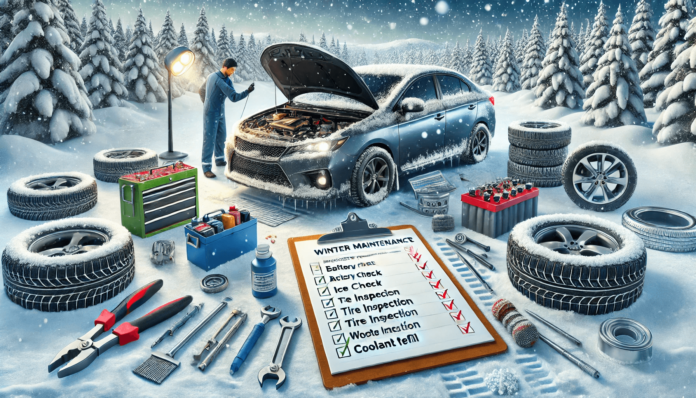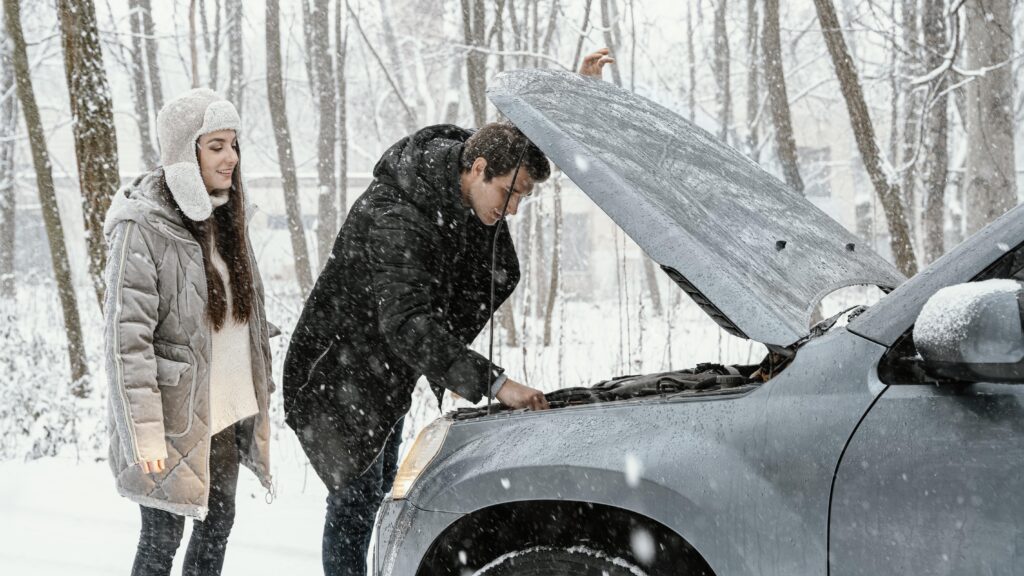
Introduction
- Comprehensive Winter Car Maintenance: Get Your Vehicle Ready for Cold Weather
- Why Winter Car Maintenance is Crucial
- Check Your Battery Health
- Inspect Tires and Ensure Proper Tread Depth
- Check and Refill Engine Coolant
- Ensure Your Heating System is Working
- Check Windshield Wipers and Washer Fluid
- Inspect and Change Engine Oil if Needed
- Test the Brakes
- Check Exterior Lights
- Lubricate Door Locks and Hinges
- Prepare an Emergency Winter Kit
- Conclusion
Proper winter car maintenance is critical to ensure your vehicle can handle the harsh conditions of the colder months. Failing to prepare your car for winter can lead to costly repairs and potential breakdowns. Checking your battery and inspecting your tires are just a few key steps in cold-weather car care, vital for ensuring both your vehicle’s performance and your safety. In this guide, we’ll explore key car service for winter tips to help keep your vehicle in optimal condition throughout the cold season.
Comprehensive Winter Car Maintenance: Get Your Vehicle Ready for Cold Weather

Ensuring your vehicle operates efficiently throughout the cold months requires proper winter car maintenance, which helps prevent issues caused by harsh winter conditions. As temperatures drop, various components of your car, such as the battery, tires, and fluids, can be negatively impacted. To avoid unexpected breakdowns or performance issues, it’s important to prepare your car in advance. Simple steps like checking your battery, switching to winter tires, and using the right engine oil can make a significant difference in how your car handles winter’s harsh conditions.
Why Winter Car Maintenance is Crucial
Freezing temperatures and icy conditions can cause significant strain on various components of your vehicle, leading to potential performance issues and damage. Batteries lose their charge faster, tires lose traction, and engine fluids can thicken. Proper winter car maintenance helps avoid these issues, ensuring your car is reliable and safe in cold weather. Implementing preventive measures can significantly lower the chances of winter breakdowns and help you avoid expensive repair bills.
Check Your Battery Health
Winter poses significant challenges for your car’s battery, often reducing its efficiency and making it harder to start the engine. Cold weather reduces its capacity, making it harder to start your vehicle.If your battery is more than three years old, it’s a good idea to get it tested before winter to make sure it can withstand the colder temperatures and avoid unexpected failures. If needed, replace it to avoid the hassle of a dead battery on a freezing morning
Inspect Tires and Ensure Proper Tread Depth
Your tires serve as the primary safeguard against slippery and icy road conditions, providing essential traction and stability during winter driving. In snowy and icy conditions, having tires with good tread depth is essential for maintaining traction. Winter tires are specifically designed to handle these conditions better than all-season tires, providing superior grip. Additionally, check your tire pressure regularly, as cold weather can cause tires to lose pressure more quickly.
Check and Refill Engine Coolant
Your car’s cooling system needs special attention in winter. Antifreeze, or coolant, is essential for protecting your engine from freezing in low temperatures, ensuring it continues to run smoothly in harsh winter conditions. Make sure the coolant levels are adequate, and check the ratio of coolant to water—it should be around 50:50 for optimal protection in cold weather. Failing to address this issue can result in your engine either overheating or freezing, both of which can lead to severe and costly damage.
Ensure Your Heating System is Working
A properly working heating system is vital not just for comfort, but also for safety, as it ensures your windows stay defrosted and clear during cold weather. Before winter sets in, test your car’s heater and defroster to make sure they are working properly. If you notice any issues, such as weak airflow or no heat at all, get it checked out by a mechanic.
Check Windshield Wipers and Washer Fluid
Visibility is crucial when driving in winter conditions. Old or worn-out windshield wipers can leave streaks or fail to clear ice and snow effectively. Replace your wiper blades if they’re not performing well. Also, fill up your washer fluid reservoir with a winter-specific formula that won’t freeze in low temperatures, helping you keep your windshield clean and clear.
Inspect and Change Engine Oil if Needed
Cold weather can thicken motor oil, reducing its ability to lubricate your engine properly. If you live in an area where temperatures regularly drop below freezing, consider switching to winter-grade oil with a lower viscosity. This ensures your engine runs smoothly even in frigid temperatures.
Test the Brakes
Your brakes are critical for safe winter driving. Ice and snow reduce your stopping power, so it’s essential that your brakes are in top condition. Have your brake pads and rotors inspected, and ensure your brake fluid is at the proper level. If you notice any grinding, squeaking, or delays in braking, have them serviced immediately.
Check Exterior Lights
With shorter days and longer nights, working exterior lights are vital for visibility. Check all your headlights, brake lights, and turn signals to ensure they’re functioning properly. Clean any dirt or grime off the lenses, and replace any dim or non-functioning bulbs. Proper lighting ensures that you can see and be seen on the road.
Lubricate Door Locks and Hinges
Cold temperatures can cause your car’s doors and locks to freeze, leaving you struggling to get into your vehicle when you need it most. Apply a lubricant, such as silicone spray, to door hinges and locks to prevent them from freezing shut during the winter. This simple step can save you from the frustration of frozen doors on a cold morning.
Prepare an Emergency Winter Kit
No matter how well-prepared your car is, winter weather can be unpredictable. It’s essential to keep an emergency kit in your car at all times, especially during winter months when unexpected situations can arise. first aid kit, ice scraper, jumper cables, a small shovel, and some non-perishable snacks. Having these essentials on hand can be a lifesaver if you get stranded or experience car trouble in cold weather.
Conclusion
Winter can be tough on your vehicle, but with proper preparation, you can avoid many of the common issues that arise in cold weather. By following these winter car maintenance tips, you’ll ensure your car stays reliable, safe, and ready to handle whatever winter throws your way.













